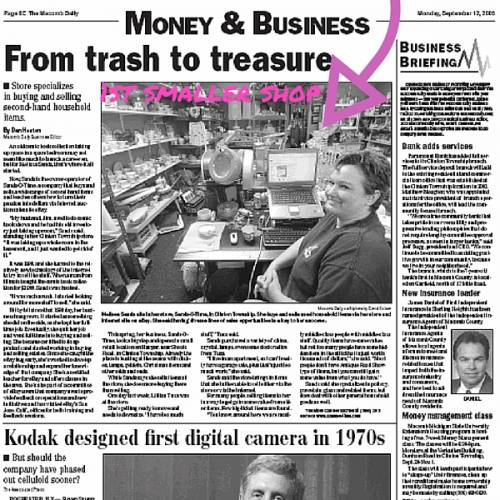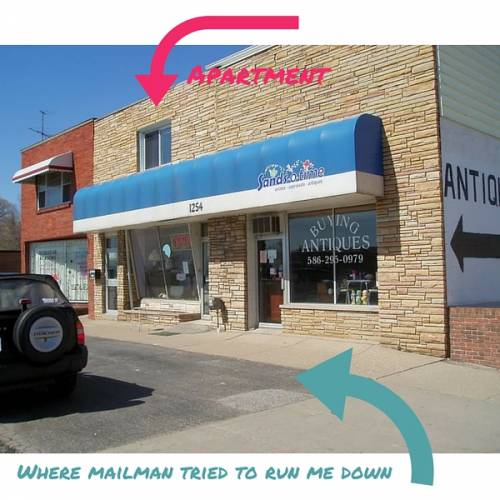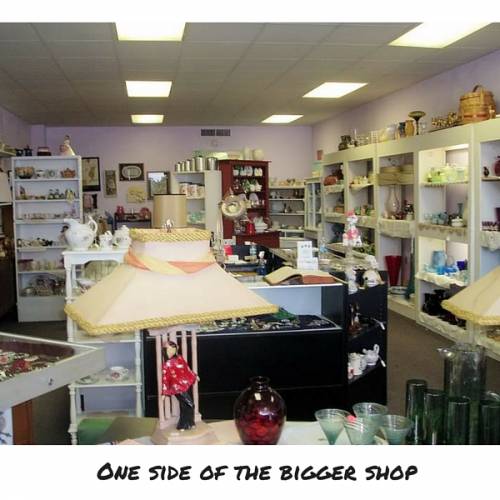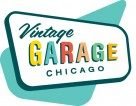
Check out an updated version of this article and more about selling vintage and antiques on BusinessofVintage.net
Check out the first two articles in the series: What's the Least you need to Get Started and Competition. If you sell vintage, or want to become a dealer someday, you are welcome to fill out the Vintage Dealer survey.
If you are in Chicago and would like to sell at the Vintage Garage, APPLY HERE.
Why I never should have opened a vintage store.
Opening a shop means the masses will flock to you. They'll see your amazing taste and be waiting at your door daily. Or not.
I had a vintage store north of Detroit in the early 2000's. When the bottom fell out in 2008, the Detroit area was hit hard. H
onestly, I wasn't happy before that. This is my story.
I wanted a place to store and ship. My online sales had taken over my home. So, I got a 750 sq. foot shop that was less than a half mile from home. It was perfect. I was more open by chance than regular hours and we had daily UPS pickups from the shop. Then...
Bigger is always better, right? Things were going well. We moved to a larger space, on a high traffic road, with an apartment we rented out over the vintage store. We rented with the option to buy and our rent would go towards the purchase price. What could go wrong? All of it.
I have the patience of a gnat; I should have known I'd hate sitting in a shop all day. Bigger shop + busy road = more open hours, but I was still bringing in more money online. The amount of money coming in from the shop was small.
I had a few dealers who rented space, but I wasn't good at managing other people. I expected them to do what I felt (at the time) were common sense things: Replenish their stock and pay for their space each month. Moral of the story there's no such thing as common sense. If you want it done, spell it out.
This was me being unprepared. I wasn't a good leader to anyone else. My focus was split between the physical store and the online store and being on calls. I thought being diversified was good, but my attention was all over the place.
 Buying opportunities walked in all the time, but it still made more work for me. People would bring in what they thought was worth money, but when I would ask what else they had, I'd usually end up making a house call. This added more hours to my week, unless I closed up the shop for the afternoon.
Buying opportunities walked in all the time, but it still made more work for me. People would bring in what they thought was worth money, but when I would ask what else they had, I'd usually end up making a house call. This added more hours to my week, unless I closed up the shop for the afternoon.
The mailman was a nightmare. He HATED coming in to get my packages he just felt it beneath him. He refused to give me a time he would be there each day, even a rough estimate. All of his shirts had the sleeves cut off and he almost ran me over going 30 miles an hour on the sidewalk in front of the shop. Stairway to Heaven blared from his postal truck. As a long time Federal employee, this guy wasn't getting fired. It sounds silly, but it was a daily nightmare.
Things became increasingly reactive. I spent more time putting out fires than making money.
The renter stopped paying rent. He stayed in the apartment though paying no rent and making life really uncomfortable. Lawyers got involved. That, combined with the 2008 crash and the subsequent crash of the Detroit auto industry.
It was already tight. Jim's (my husband) steady and secure job went to part time; I had to much inventory. When people started losing their jobs, vintage and antique was done. We made the decision to shut down the shop.
What do I wish I would have done differently?
1. Started with a plan. Starting with looking at the hours of operation. How many hours would I have to put in? If I wanted dealers, what would be required of them? What about a website, business phone number, a Facebook page for the vintage store?
2. Overhead costs. There's simple math costs vs what needs to come in to pay the bills. Break that down by the day.
 3. Known myself better. Having no patience and having been diagnosed with Adult ADHD, which can often lead to impulsive decision making, I should have looked at myself harder. Why would I think having a structure like THIS would work for me? I was convinced a vintage store was the answer without knowing a thing about retail. I was determined to try this and no one could talk me out of it.
3. Known myself better. Having no patience and having been diagnosed with Adult ADHD, which can often lead to impulsive decision making, I should have looked at myself harder. Why would I think having a structure like THIS would work for me? I was convinced a vintage store was the answer without knowing a thing about retail. I was determined to try this and no one could talk me out of it.
4. Nothing easy about being a landlord. If the tenant paid each month it would pay a good portion of our rent. He knew more than I did about rental laws and took full advantage. I didn't protect myself. I didn't understand or consider what would happen in the worst case scenario.
5. I loved the idea of my name on the door and a sign out front. it didn't mean anything. It set me back a few years.
I would love to hear from vintage store owners about what you love most about having a shop and what you wish you would have known before. If you wouldn't mind sharing, please send me a message. I'd love to hear what you feel the benefits of owning a physical vintage store are: Do you get buying opportunities? Does it lends credibility? What is the biggest payoff?
If you'd like to get a notice when the new post is up, sign up below. If you sell vintage or want to become a dealer someday, you are welcome to fill out the survey.
Melissa 🙂
The Chicago Vintage Clothing and Jewelry Show will take place March 1, 3pm to 8pm, March 2, 2019. 10am to 5pm at 5649 N. Sheridan Road, Chicago, IL 60660. St. Andrews Greek Orthodox Church at the corner of Hollywood and N. Sheridan Road. The official website is www.vintageclothingandjewelry.com
The 2018 Vintage Garage dates are April 22, May 20, June 17 , July 15, August 19, September 16, and October 21. There will be 100 vendors offering cool vintage and antique pieces every 3rd Sunday, April to October. Vintage Garage is located at 5051 N. Broadway, Chicago, IL 60640. Hours are 10:00 am to 5:00 pm with a $5 admission. Official website is www.vintagegaragechicago.com.
